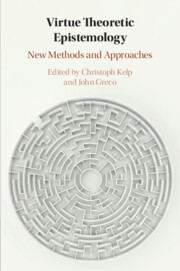
-
Select format
-
- Publisher:
- Cambridge University Press
- Publication date:
- July 2020
- July 2020
- ISBN:
- 9781108666404
- 9781108481212
- 9781108740463
- Dimensions:
- (228 x 152 mm)
- Weight & Pages:
- 0.56kg, 272 Pages
- Dimensions:
- (229 x 152 mm)
- Weight & Pages:
- 0.41kg, 272 Pages
- Subjects:
- Epistemology and Metaphysics, Philosophy
You may already have access via personal or institutional login- Subjects:
- Epistemology and Metaphysics, Philosophy
Book description
Virtue epistemology is one of the most flourishing research programmes in contemporary epistemology. Its defining thesis is that properties of agents and groups are the primary focus of epistemic theorising. Within virtue epistemology two key strands can be distinguished: virtue reliabilism, which focuses on agent properties that are strongly truth-conducive, such as perceptual and inferential abilities of agents; and virtue responsibilism, which focuses on intellectual virtues in the sense of character traits of agents, such as open-mindedness and intellectual courage. This volume brings together ten new essays on virtue epistemology, with contributions to both of its key strands, written by leading authors in the field. It will advance the state of the art and provide readers with a valuable overview of what virtue epistemology has achieved.
Reviews
‘This estimable collection presents essays from many of the most influential authors working in virtue epistemology - an approach to epistemology that either focuses on agent-centered factors to analyze important epistemic concepts such as knowledge, justification, reliability, or warrant or sees virtue epistemology as a fruitful way to conceive of values specific to cognition, such as open-mindedness or bias.’
N. D. Smith Source: Choice
Contents
Metrics
Altmetric attention score
Full text views
Full text views help Loading metrics...
Loading metrics...
* Views captured on Cambridge Core between #date#. This data will be updated every 24 hours.
Usage data cannot currently be displayed.
Accessibility standard: Unknown
Why this information is here
This section outlines the accessibility features of this content - including support for screen readers, full keyboard navigation and high-contrast display options. This may not be relevant for you.
Accessibility Information
Accessibility compliance for the PDF of this book is currently unknown and may be updated in the future.


